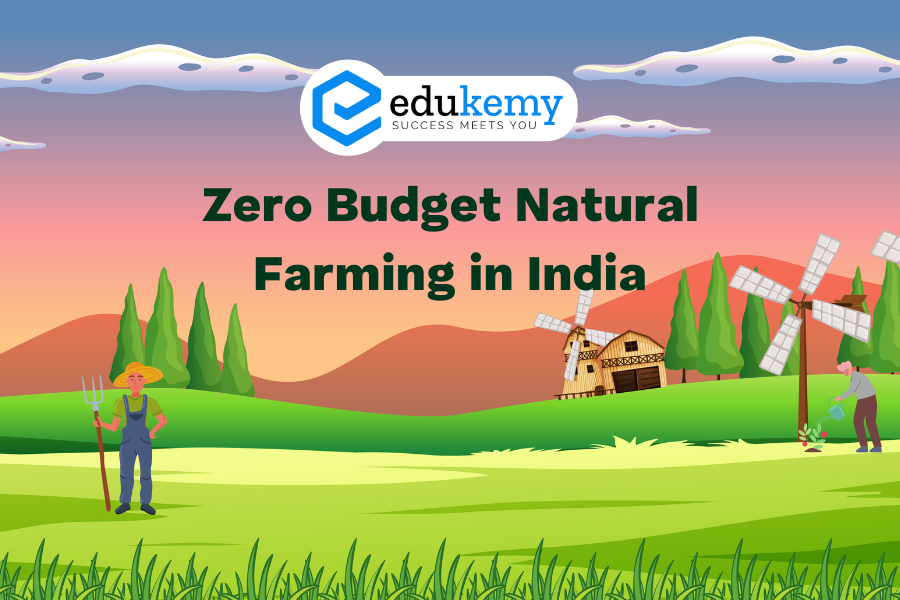
Introduction to ZBNF: Zero Budget Natural Farming (ZBNF) emerges as a transformative set of farming practices gaining widespread adoption in various states across India. Originating and finding remarkable success in southern India, notably in Andhra Pradesh and Karnataka, ZBNF stands as a beacon of sustainable agriculture. The visionary behind ZBNF is Subhash Palekar, whose advocacy has played a pivotal role in its evolution and dissemination.
Contents
Principles of ZBNF:
- Zero Credit, Zero Expense:
- The term “zero budget” in ZBNF denotes the elimination of credit and expenses. It signifies a farming approach where no money is spent on purchased inputs, promising a drastic reduction in production costs.
- Natural Farming:
- ZBNF promotes farming in harmony with nature, emphasizing a chemical-free approach. It encourages practices that work with the natural ecosystem, avoiding the use of synthetic chemicals.
Union Budget Embrace:
- The Union Budget for 2019-20 underscored the importance of zero budget natural farming, advocating for its widespread promotion. This recognition at the national level reflects the potential impact and significance of ZBNF in transforming agriculture.
Addressing Agrarian Challenges:
- The prevailing agrarian crisis in India, marked by the unviability of small-scale farming and challenges such as inaccessible and expensive privatized seeds, inputs, and markets, has created a pressing need for innovative solutions.
ZBNF as a Viable Solution:
- In this context, ZBNF emerges as a viable and sustainable solution. By eliminating the need for external credit and minimizing expenses on purchased inputs, it offers a pathway for small-scale farmers to navigate the challenges of contemporary agriculture.
Key Advantages and Impact:
- Cost Reduction: ZBNF promises a significant reduction in production costs, making farming economically viable for small-scale practitioners.
- Chemical-Free Farming: The emphasis on natural farming aligns with environmental sustainability, promoting soil health and reducing reliance on synthetic chemicals.
- Accessible and Inclusive: By focusing on locally available resources and nature-centric practices, ZBNF democratizes agriculture, making it more accessible and inclusive.
Conclusion: Zero Budget Natural Farming stands as a beacon of hope in the face of agrarian challenges, offering a sustainable and cost-effective alternative. With its adoption gaining momentum and receiving national recognition, ZBNF represents a transformative shift towards a more inclusive and nature-friendly agricultural paradigm in India.
FAQs
Q: What is Zero Budget Natural Farming (ZBNF)?
Zero Budget Natural Farming (ZBNF) is an agricultural practice that emphasizes natural farming methods without the use of chemical fertilizers and pesticides. It was popularized by Subhash Palekar, an Indian agriculturist. ZBNF promotes the use of locally available natural resources, such as cow dung, urine, and compost, to enhance soil fertility and crop yields.
Q: How does ZBNF benefit Indian farmers?
ZBNF offers several benefits to Indian farmers. It reduces input costs since farmers do not need to purchase chemical fertilizers and pesticides. Additionally, it enhances soil health and fertility over time, leading to sustainable agricultural practices. Moreover, ZBNF helps conserve water and promotes biodiversity, contributing to long-term environmental sustainability.
Q: What crops are suitable for ZBNF in India?
A wide variety of crops can be cultivated using ZBNF techniques in India. These include staple food crops such as rice, wheat, and millets, as well as fruits, vegetables, pulses, and spices. ZBNF methods are adaptable to different agro-climatic regions across the country, making it suitable for diverse cropping patterns.
Q: How can farmers transition to ZBNF practices?
Transitioning to ZBNF requires farmers to undergo training and adopt new farming techniques. This typically involves workshops, demonstrations, and knowledge-sharing sessions conducted by agricultural experts and organizations. Farmers can start by gradually reducing chemical inputs while implementing ZBNF methods such as mulching, intercropping, and using biofertilizers.
Q: Are there any success stories of ZBNF adoption in India?
Yes, there are several success stories of ZBNF adoption in India. In states like Andhra Pradesh, Karnataka, and Maharashtra, many farmers have successfully transitioned to ZBNF practices and witnessed improvements in soil fertility, crop yields, and income levels. Government initiatives and support from non-governmental organizations have played a crucial role in scaling up ZBNF adoption and promoting sustainable agriculture across the country.
In case you still have your doubts, contact us on 9811333901.
For UPSC Prelims Resources, Click here
For Daily Updates and Study Material:
Join our Telegram Channel – Edukemy for IAS
- 1. Learn through Videos – here
- 2. Be Exam Ready by Practicing Daily MCQs – here
- 3. Daily Newsletter – Get all your Current Affairs Covered – here
- 4. Mains Answer Writing Practice – here

